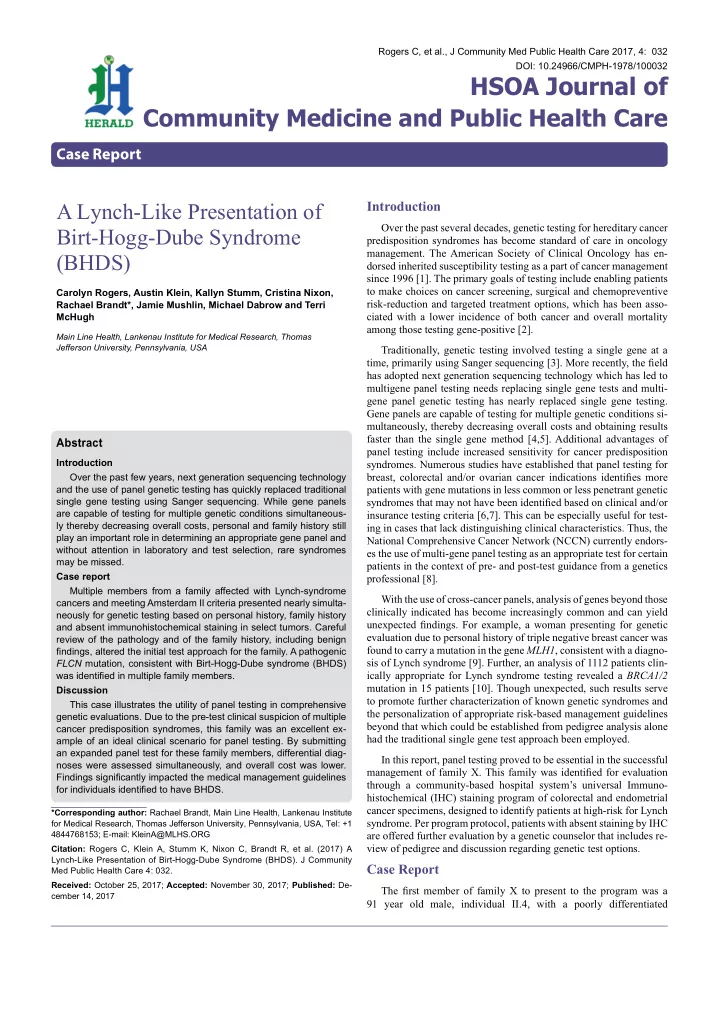

Rogers C, et al., J Community Med Public Health Care 2017, 4: 032 DOI: 10.24966/CMPH-1978/100032 HSOA Journal of Community Medicine and Public Health Care Case Report A Lynch-Like Presentation of Introduction Over the past several decades, genetic testing for hereditary cancer Birt-Hogg-Dube Syndrome predisposition syndromes has become standard of care in oncology management. The American Society of Clinical Oncology has en- (BHDS) dorsed inherited susceptibility testing as a part of cancer management since 1996 [1]. The primary goals of testing include enabling patients to make choices on cancer screening, surgical and chemopreventive Carolyn Rogers, Austin Klein, Kallyn Stumm, Cristina Nixon, risk-reduction and targeted treatment options, which has been asso- Rachael Brandt*, Jamie Mushlin, Michael Dabrow and Terri ciated with a lower incidence of both cancer and overall mortality McHugh among those testing gene-positive [2]. Main Line Health, Lankenau Institute for Medical Research, Thomas Jefferson University, Pennsylvania, USA Traditionally, genetic testing involved testing a single gene at a time, primarily using Sanger sequencing [3]. More recently, the fjeld has adopted next generation sequencing technology which has led to multigene panel testing needs replacing single gene tests and multi- gene panel genetic testing has nearly replaced single gene testing. Gene panels are capable of testing for multiple genetic conditions si- multaneously, thereby decreasing overall costs and obtaining results faster than the single gene method [4,5]. Additional advantages of Abstract panel testing include increased sensitivity for cancer predisposition Introduction syndromes. Numerous studies have established that panel testing for breast, colorectal and/or ovarian cancer indications identifjes more Over the past few years, next generation sequencing technology patients with gene mutations in less common or less penetrant genetic and the use of panel genetic testing has quickly replaced traditional single gene testing using Sanger sequencing. While gene panels syndromes that may not have been identifjed based on clinical and/or are capable of testing for multiple genetic conditions simultaneous- insurance testing criteria [6,7]. This can be especially useful for test- ly thereby decreasing overall costs, personal and family history still ing in cases that lack distinguishing clinical characteristics. Thus, the play an important role in determining an appropriate gene panel and National Comprehensive Cancer Network (NCCN) currently endors- without attention in laboratory and test selection, rare syndromes es the use of multi-gene panel testing as an appropriate test for certain may be missed. patients in the context of pre- and post-test guidance from a genetics Case report professional [8]. Multiple members from a family affected with Lynch-syndrome With the use of cross-cancer panels, analysis of genes beyond those cancers and meeting Amsterdam II criteria presented nearly simulta- clinically indicated has become increasingly common and can yield neously for genetic testing based on personal history, family history unexpected fjndings. For example, a woman presenting for genetic and absent immunohistochemical staining in select tumors. Careful evaluation due to personal history of triple negative breast cancer was review of the pathology and of the family history, including benign found to carry a mutation in the gene MLH1 , consistent with a diagno- fjndings, altered the initial test approach for the family. A pathogenic sis of Lynch syndrome [9]. Further, an analysis of 1112 patients clin - FLCN mutation, consistent with Birt-Hogg-Dube syndrome (BHDS) ically appropriate for Lynch syndrome testing revealed a BRCA1/2 was identifjed in multiple family members. mutation in 15 patients [10]. Though unexpected, such results serve Discussion to promote further characterization of known genetic syndromes and This case illustrates the utility of panel testing in comprehensive the personalization of appropriate risk-based management guidelines genetic evaluations. Due to the pre-test clinical suspicion of multiple beyond that which could be established from pedigree analysis alone cancer predisposition syndromes, this family was an excellent ex- had the traditional single gene test approach been employed. ample of an ideal clinical scenario for panel testing. By submitting an expanded panel test for these family members, differential diag- In this report, panel testing proved to be essential in the successful noses were assessed simultaneously, and overall cost was lower. management of family X. This family was identifjed for evaluation Findings signifjcantly impacted the medical management guidelines through a community-based hospital system’s universal Immuno- for individuals identifjed to have BHDS. histochemical (IHC) staining program of colorectal and endometrial cancer specimens, designed to identify patients at high-risk for Lynch *Corresponding author: Rachael Brandt, Main Line Health, Lankenau Institute syndrome. Per program protocol, patients with absent staining by IHC for Medical Research, Thomas Jefferson University, Pennsylvania, USA, Tel: +1 4844768153; E-mail: KleinA@MLHS.ORG are offered further evaluation by a genetic counselor that includes re- Citation: Rogers C, Klein A, Stumm K, Nixon C, Brandt R, et al. (2017) A view of pedigree and discussion regarding genetic test options. Lynch-Like Presentation of Birt-Hogg-Dube Syndrome (BHDS). J Community Case Report Med Public Health Care 4: 032. Received: October 25, 2017; Accepted: November 30, 2017; Published: De- The fjrst member of family X to present to the program was a cember 14, 2017 91 year old male, individual II.4, with a poorly differentiated
Recommend
More recommend